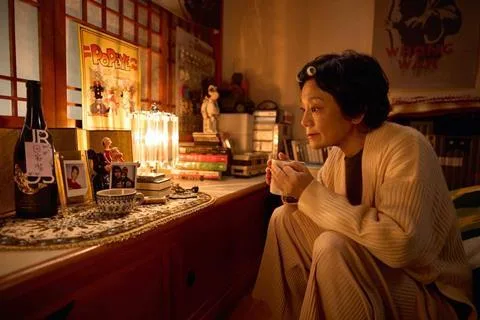Dir/scr: Huang Xi. Taiwan. 2024. 126mins Sixty four-year-old Taiwanese divorcee Jin (Sylvia Chang) has a complicated relationship with motherhoo
Dir/scr: Huang Xi. Taiwan. 2024. 126mins
Sixty four-year-old Taiwanese divorcee Jin (Sylvia Chang) has a complicated relationship with motherhood; she’s sceptical and slightly disapproving when her lesbian daughter Zuer (Eugenie Liu) travels to New York to embark on IVF treatment with her girlfriend. But when tragedy strikes and Jin finds herself the legal guardian of her daughter’s frozen embryo, she must come to terms with her own past while wrestling with a monumental decision regarding the future. The result is an elegant and affecting Taipei and New York-set sophomore picture from Taiwan-based director Huang Xi (Missing Johnny).
Elegant and affecting
The film screens in Tokyo’s main competition, having first premiered in the Platform section at Toronto where it earned an honourable mention. It will next show at the Taipei Golden Horse Film Festival, where Chang took home the Best Actress prize last year for her performance in the Hong Kong drama A Light Never Goes Out. Chang, who executive produced this film along with Hou Hsiao-Hsien, is terrific – her combination of steeliness and vulnerability makes Jin an engaging and occasionally enraging guide through the loving but turbulent relationships between three generations of women in one fractured family.
The knotty dynamics between Jin, Zuer, Jin’s mother Shen Yan-hua (Alannah Ong) and Emma (Karena Lam), the daughter that Jin gave up for adoption following a teenage pregnancy in New York, are deftly introduced in an opening prologue that plays out in Taipei in the winter of 2018. Jin is in hospital with a broken leg; at her bedside is her mother, whose mind is starting to cloud with dementia and who, until recently, was living in New York.
The serene and self-possessed Emma accompanied her grandmother back to Taiwan, but her presence has aggravated the already testy relationship between Jin and Zuer, who only recently learned that she had an older American half-sister. “She’s not my sister. She’s my mother’s daughter,” snarls Zuer, her hair twisted into punky spikes and a stripe of electric-blue glitter daubed under her eyes. At Zuer’s side is Jaiyi (Tracy Chou) – it’s an open secret that she is Zuer’s girlfriend, but neither Zuer nor her mother are yet ready to have that conversation.
The meat of the story takes place six years later. The dementia has gnawed away at Jin’s mother’s memory: she barely recognises her daughter, and when she does, she still sees her as a pregnant 16-year-old. And although Jin is settling comfortably into retirement, the memory of her younger self hasn’t faded. With the shocking news of the deaths of Zuer and Jaiyi in a car accident in New York, Jin finds that she must make a decision about the fate of Zuer’s embryo – a weighty responsibility that uncomfortably recalls her teenage crisis.
The emotional intensity of this sudden swerve in Jin’s life is reflected in the colour palette, which switches from the demure restraint of her life in Taiwan to a richly saturated combination of reds, blues and greens when she heads to New York. Jin moves into the scuzzy but welcoming hipster Chinatown rental apartment that Zuer shared with Jaiyi while they underwent IVF treatment. The walls are scrawled with messages from previous tenants – Jin scours them for a sign of her daughter’s voice.
Initially, she’s ill at ease in the cluttered, womb-like space where her daughter had made a home, but increasingly it feels like a refuge from the chill of grief and the bruising blue New York winter delicate outside. Emma is present too, both as an imaginary figure who acts as a sounding board for Jin’s moral quandary and, in reality, in a powerful scene towards the end of the film, in which Jin finally comes to terms with her guilt and perceived failures as a mother.
Production company: Sun Lok Productions
International sales: Andrews Film Ltd. [email protected]
Producers: Shao Dongxu, Liu Hsin-li
Cinematography: Yao Hung-i
Editing: Liao Ching-sung
Production design: Hwarng Wern-ying
Music: Kay Huang, Point Hsu, Angu Liang, Mukio Chang
Main cast: Sylvia Chang, Karena Lam, Alannah Ong, Winston Chao, Eugenie Liu, Tracy Chou

COMMENTS